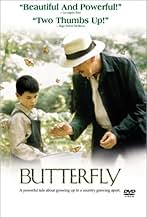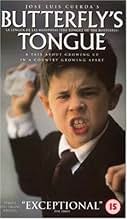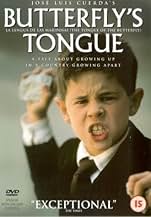IMDb RATING
7.6/10
10K
YOUR RATING
Spain, 1936. Moncho is an outcast at school but is able to form a strong bond with his outspoken teacher. When fascism arrives to Spain, his teacher is considered an enemy of the regime.Spain, 1936. Moncho is an outcast at school but is able to form a strong bond with his outspoken teacher. When fascism arrives to Spain, his teacher is considered an enemy of the regime.Spain, 1936. Moncho is an outcast at school but is able to form a strong bond with his outspoken teacher. When fascism arrives to Spain, his teacher is considered an enemy of the regime.
- Director
- Writers
- Stars
- Awards
- 6 wins & 19 nominations total
Elena Bagutta
- Carmiña
- (as Elena Fernández)
Roberto Vidal Bolaño
- Boal
- (as Roberto Vidal)
Antonio Lagares
- Alcalde
- (as Tucho Lagares)
- Director
- Writers
- All cast & crew
- Production, box office & more at IMDbPro
Featured reviews
It's a beautiful (and too rare) thing to witness a child actor who can avoid the saccharine cutesiness so common to mainstream American child actors. In this film full of children there are, happily, no cloying, exaggerated "cute kid" moments.
The real beauty of La lengua de las mariposas is what's unspoken -- the truths that remain between the lines. The film's political theme is never heavy-handed, and its vivid and fascinating depiction of a turbulent moment in Spanish history has inspired in me a desire to learn more. Without spoiling the ending (which I read as fairly subversive, at least to an American audience), I must say I wasn't entirely surprised at what happened. It brought a tear to my eye and it's still making me think, three days later.
Those who liked this film should also see La Vita e Bella (Life Is Beautiful) and La notte di San Lorenzo (Night Of Shooting Stars), which are similar and may appeal equally, if not more.
The real beauty of La lengua de las mariposas is what's unspoken -- the truths that remain between the lines. The film's political theme is never heavy-handed, and its vivid and fascinating depiction of a turbulent moment in Spanish history has inspired in me a desire to learn more. Without spoiling the ending (which I read as fairly subversive, at least to an American audience), I must say I wasn't entirely surprised at what happened. It brought a tear to my eye and it's still making me think, three days later.
Those who liked this film should also see La Vita e Bella (Life Is Beautiful) and La notte di San Lorenzo (Night Of Shooting Stars), which are similar and may appeal equally, if not more.
This one was one of the excellent movies I have seen for the last couple of years. It takes you back to 1936, Spanish War in Galicia. Telling the truth I did not know well what happened there exactly . But this movie showed how the war influenced those people who lived in a small town to live their small lives. By the time they showed the ending scene my heart ached. I truly wished that someone could have been here with me to enjoy the afterglow this time. It has not happened to me lately. Plus their way to take this film was exquisite. Every single scene was beautiful and sentimental as if you turn around the post cards stand at the souvenir shop.
Interesting and thought-provoking drama set during Spanish Civil War and filmed on wonderful landscapes from Galicia . For a kid named Moncho (Manuel Lozano) starts a new life , he begins school , there he has a sensible and aging teacher named Don Gregorio (Fernando Fernan Gomez) , a Republican veteran like his daddy . He makes a friend in the little village called Roque , Moncho starts to figure out some mysteries about life , and , with his older brother, a budding saxophone player, he makes a voyage with the band called ¨The Blue Orchestra¨ from their village around in Galicia . He soon journeys into adulthood through a friendship with his teacher , forming bonds with new friends and walking on the idyllic fields . Armed with a rebellious nature, opposes life lessons from his father and his love for a little girl will open doors to a world of sensitive feelings that will make her trip turns into a tender , vital and unforgettable experience but also tragic . The screen livens up as love blossoms between Moncho and his little girlfriend and as a love for a teacher becomes evident and finally risked . But it's also the year that the Spanish Republic comes under fire from Franco revolt and country growing apart. As sides are drawn and power falls clearly to one side , the forces of fright , rebellion and treason alter profoundly what should be the pleasure of growing-up .
Drama with historical and romantic elements ; including enjoyable performances and adequate set design . ¨Tongue of Butterflies¨¨ results to be other of the innumerable stories to deal with dramatic deeds regarding the Civil War background . A familiar theme about the global horrors of a fratricide war , impossible to forget to our cinema . An agreeable coming-of-age story plenty of enjoyable moments , moving feelings and tragic finale . Director Jose Luis Cuerda , also writes the interesting script along with prestigious screenwriter Rafael Azcona , Luis Garcia Berlanga's usual . Filmed in his usual formal and stylistic scholarship , without leaving a trace the thought-provoking issues , in terms of dramatic and narrative excitement . The flick can be defined as a realistic tragedy-drama , a romantic history , a historic fresco and a socio-political fable . The main problem has to face , beyond not being able to avoid falling into the politic pamphlet is precisely derived from the coldness of its staging , some slow-moving scenes and including some surprisingly and inadequate sexual scenes . Because the story needs a vibration more real than the one offered in this sometimes joyful as well as sad flick , though also contains humorous and enjoyable moments as when the children are gathered and play and enjoy themselves , the unforgettable scenes when the oldest brother plays saxophone in the presence of a Chinese girl and of course the stirring and moving ending . Anyway, it's is compensated with the great performances from Fernando Fernan Gomez and and the boy Manuel Lozano , interpreters who provided a considerable boost to the result . Jose Luis Cuerda is a great director of actors and the main players are complemented by a good cast of secondaries as Uxia Blanco , Gonzalo Uriarte , Elena Fernandez Guillermo , ¨Willy¨, Toledo, among others ; all of them forming a powerful human group of support cast and giving excellent interpretations . Special mention to magnificent musical score by Alejandro Amenabar who composes an evocative as well as sensitive musical score . Including a spotless pictorial cinematography by Javier Salmones and a willingness , almost perfect of the elements of each shot , every sequence , every space . Shot on north of Spain, where have been filmed the gorgeous landscapes , marvelously reflected on location in Ourense , Galicia . The film won several Goya Awards -Spanish Oscar- such as : Goya Best Screenplay - Adapted to Rafael Azcona , José Luis Cuerda and Manuel Rivas , Nominated Goya Best Actor Fernando Fernán Gómez , Best Cinematography to Javier Salmones and Best Costume Design to Sonia Grande , Best Editing to Ignacio Cayetano and Best Director to José Luis Cuerda and Best Film .
This Fernando Bovaira production was professionally written/produced by Jose Luis Cuerda who also efficiently directed and resulted to get an acceptable success at Spanish Box office . Cuerda is a veteran professional , being his film debut ¨Pares and Nones¨ a typical Madrid comedy . He subsequently directed ¨El Bosque Animado¨ also with script by notorious Rafael Azcona and based on Wenceslao Fernandez Florez's novel . His most personal movies were two comedies with a peculiar and surrealist sense of humor titled ¨Amanece Que no Es Poco¨ and ¨Asi en el Cielo Como en Tierra¨. He followed directing failures as a drama titled ¨Viuda de Capitan Contreras¨ and more comedies as ¨La Marrana¨ and ¨Tocando Fondo¨ . His greatest success corresponds as producer , as he produced hits for Alejandro Amenabar as ¨Tesis¨ and ¨Abre Los Ojos¨, among others . This highly-acclaimed and successful movie titled ¨Lengua De Mariposas¨ has a rating as ¨better than average¨ , it's a beautiful and powerful film . Two thumbs up .
Drama with historical and romantic elements ; including enjoyable performances and adequate set design . ¨Tongue of Butterflies¨¨ results to be other of the innumerable stories to deal with dramatic deeds regarding the Civil War background . A familiar theme about the global horrors of a fratricide war , impossible to forget to our cinema . An agreeable coming-of-age story plenty of enjoyable moments , moving feelings and tragic finale . Director Jose Luis Cuerda , also writes the interesting script along with prestigious screenwriter Rafael Azcona , Luis Garcia Berlanga's usual . Filmed in his usual formal and stylistic scholarship , without leaving a trace the thought-provoking issues , in terms of dramatic and narrative excitement . The flick can be defined as a realistic tragedy-drama , a romantic history , a historic fresco and a socio-political fable . The main problem has to face , beyond not being able to avoid falling into the politic pamphlet is precisely derived from the coldness of its staging , some slow-moving scenes and including some surprisingly and inadequate sexual scenes . Because the story needs a vibration more real than the one offered in this sometimes joyful as well as sad flick , though also contains humorous and enjoyable moments as when the children are gathered and play and enjoy themselves , the unforgettable scenes when the oldest brother plays saxophone in the presence of a Chinese girl and of course the stirring and moving ending . Anyway, it's is compensated with the great performances from Fernando Fernan Gomez and and the boy Manuel Lozano , interpreters who provided a considerable boost to the result . Jose Luis Cuerda is a great director of actors and the main players are complemented by a good cast of secondaries as Uxia Blanco , Gonzalo Uriarte , Elena Fernandez Guillermo , ¨Willy¨, Toledo, among others ; all of them forming a powerful human group of support cast and giving excellent interpretations . Special mention to magnificent musical score by Alejandro Amenabar who composes an evocative as well as sensitive musical score . Including a spotless pictorial cinematography by Javier Salmones and a willingness , almost perfect of the elements of each shot , every sequence , every space . Shot on north of Spain, where have been filmed the gorgeous landscapes , marvelously reflected on location in Ourense , Galicia . The film won several Goya Awards -Spanish Oscar- such as : Goya Best Screenplay - Adapted to Rafael Azcona , José Luis Cuerda and Manuel Rivas , Nominated Goya Best Actor Fernando Fernán Gómez , Best Cinematography to Javier Salmones and Best Costume Design to Sonia Grande , Best Editing to Ignacio Cayetano and Best Director to José Luis Cuerda and Best Film .
This Fernando Bovaira production was professionally written/produced by Jose Luis Cuerda who also efficiently directed and resulted to get an acceptable success at Spanish Box office . Cuerda is a veteran professional , being his film debut ¨Pares and Nones¨ a typical Madrid comedy . He subsequently directed ¨El Bosque Animado¨ also with script by notorious Rafael Azcona and based on Wenceslao Fernandez Florez's novel . His most personal movies were two comedies with a peculiar and surrealist sense of humor titled ¨Amanece Que no Es Poco¨ and ¨Asi en el Cielo Como en Tierra¨. He followed directing failures as a drama titled ¨Viuda de Capitan Contreras¨ and more comedies as ¨La Marrana¨ and ¨Tocando Fondo¨ . His greatest success corresponds as producer , as he produced hits for Alejandro Amenabar as ¨Tesis¨ and ¨Abre Los Ojos¨, among others . This highly-acclaimed and successful movie titled ¨Lengua De Mariposas¨ has a rating as ¨better than average¨ , it's a beautiful and powerful film . Two thumbs up .
I give this movie 10 points and even Woody Allen said he liked it. It's a very touching story about a child and his teacher in the period previous to the Spanish civil war. The movie is based on a novel , the screenplay is almost perfect .The performances , specially but one of the best Spanish actors ever Fernando Fernan Gomez as the teacher is amazing and one you will remember for a long long time and the child Manuel Lozano is at the same quality level of performance . I have seen this movie only once and I still remembered it now. José Luis Cuerda , the director , do a very good job and Alejandro Amenabar wrote the soundtrack.The characters are so well constructed you will identify with them. I recommend this movie . Don't miss it .
Adapted by screenwriter Rafael Azcona from three stories in Manuel Rivas novel "Que Me Quieres, Amor", Butterfly is a rare and insightful coming-of-age story that takes place in a rural part of northern Spain during the Second Republic when Spain had a brief flirtation with socialism and democracy. Against a background of the growing clouds of the Spanish Civil War, the film depicts the relationship between asthmatic 7-year old Moncho (Manuel Lozano) and his liberal schoolteacher played by the great Spanish actor Fernando Fernan Gomez (All About my Mother, The Grandfather).
Butterfly does not directly involve politics (at least until the end) but tells its story through snapshots of young Moncho, In the beginning, he is a quiet, shy boy who is afraid go to school because he thinks his teacher, Don Gregorio, will hit him. Gregorio, however, is a kind spirit who teaches his students to appreciate poetry, the beauty of nature, and the spirit of loving one another. Moncho grows from a frightened child to an enthusiastic young boy who is eager to learn all that he can about life. He divides his time between following his older brother's exploits playing the saxophone in a local band and chasing butterflies with his teacher friend. The butterfly here seems to be a symbol both of freedom and transformation.
I felt very involved with this young boy's world and found Lozano to be one of the most beguiling child actors that I have seen in a long time. His performance alone saves the film from Miramax-type sentimentality (which it occasionally drifts towards). Gomez is also wonderful as the compassionate teacher, symbolizing the humanitarian government that Spain enjoyed before the onset of fascism.
Eventually, Moncho must choose between his love for the teacher who opened his eyes to the beauty and wonder of the natural world and the ugly pressures of his family and neighbors to take sides in the political conflict. With the ending as shocking and memorable as Truffaut's The 400 Blows, Butterfly powerfully illuminates the human cost of war.
Butterfly does not directly involve politics (at least until the end) but tells its story through snapshots of young Moncho, In the beginning, he is a quiet, shy boy who is afraid go to school because he thinks his teacher, Don Gregorio, will hit him. Gregorio, however, is a kind spirit who teaches his students to appreciate poetry, the beauty of nature, and the spirit of loving one another. Moncho grows from a frightened child to an enthusiastic young boy who is eager to learn all that he can about life. He divides his time between following his older brother's exploits playing the saxophone in a local band and chasing butterflies with his teacher friend. The butterfly here seems to be a symbol both of freedom and transformation.
I felt very involved with this young boy's world and found Lozano to be one of the most beguiling child actors that I have seen in a long time. His performance alone saves the film from Miramax-type sentimentality (which it occasionally drifts towards). Gomez is also wonderful as the compassionate teacher, symbolizing the humanitarian government that Spain enjoyed before the onset of fascism.
Eventually, Moncho must choose between his love for the teacher who opened his eyes to the beauty and wonder of the natural world and the ugly pressures of his family and neighbors to take sides in the political conflict. With the ending as shocking and memorable as Truffaut's The 400 Blows, Butterfly powerfully illuminates the human cost of war.
Did you know
- TriviaThe original Spanish title of the movie is "La lengua de las mariposas" which is translated into English as "The Tongue of the Butterflies" though it could also be translated as "The Language of Butterflies" too. The right way is the first meaning, because at a point of the movie Don Gregorio talks his classroom about butterflies, explaining how they have a coiled proboscis used for sucking the flowers nectar.
- SoundtracksEn er mundo
Written by Juan Quintero (as Juan Quintero Muñoz) and Jesús Fernández Lorenzo
- How long is Butterfly?Powered by Alexa
Details
Box office
- Gross US & Canada
- $2,092,682
- Gross worldwide
- $7,738,129
- Runtime1 hour 36 minutes
- Color
- Sound mix
- Aspect ratio
- 2.35 : 1
Contribute to this page
Suggest an edit or add missing content

Top Gap
By what name was La Langue des papillons (1999) officially released in India in English?
Answer



























